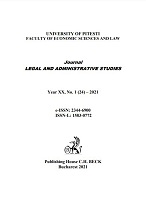THE TRANSLATIONAL EFFECT OF THE CONTRACT IN THE LIGHT OF THE NEW CIVIL CODE
THE TRANSLATIONAL EFFECT OF THE CONTRACT IN THE LIGHT OF THE NEW CIVIL CODE
Author(s): Dumitru VăduvaSubject(s): Civil Law
Published by: C.H. Beck Publishing House - Romania
Keywords: the effect of the contract; translation effect; obligation of the give; the risk of losing the good; the effective;
Summary/Abstract: The new Civil Code maintains the organization of the regime of the translational effect of the contract between the parties as it has been stated by the Civil Code of 1864. Being an effect specific to one of the species of obligations, the obligation to give, seems surprising its regulation among the general effects of the contract. Considering that the execution of this effect takes place by law, at the moment of concluding the contract, real effect, which derogates from the general regime of execution of obligations (to do and not to do), which has them through the personal performance of the debtor, performed by voluntary payment or, if necessary, forced execution, the organization of the translational effect within the general effect of the contract is rational. The regime of this effect is also maintained, except for the amendment brought by the new Civil Code regarding the part that bears the risk of losing the good until its delivery to the acquirer. The new Civil Code puts the alienator at risk of losing the property (res perit debtors).
Journal: Studii Juridice şi Administrative
- Issue Year: 24/2021
- Issue No: 1
- Page Range: 105-115
- Page Count: 11
- Language: English

